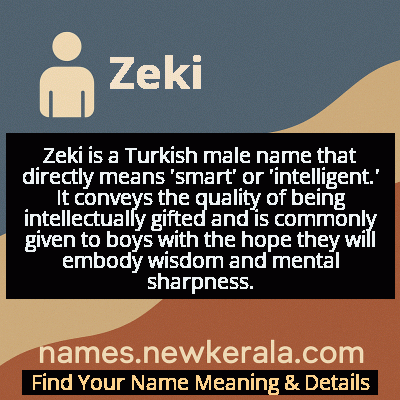Zeki Name Meaning & Details
Origin, Popularity, Numerology Analysis & Name Meaning of Zeki
Discover the origin, meaning, and cultural significance of the name ZEKI. Delve into its historical roots and explore the lasting impact it has had on communities and traditions.
Name
Zeki
Gender
Male
Origin
Turkish
Lucky Number
6
Meaning of the Name - Zeki
Zeki is a Turkish male name that directly means 'smart' or 'intelligent.' It conveys the quality of being intellectually gifted and is commonly given to boys with the hope they will embody wisdom and mental sharpness.
Zeki - Complete Numerology Analysis
Your Numerology Number
Based on Pythagorean Numerology System
Ruling Planet
Venus
Positive Nature
Harmonious, responsible, caring, and artistic.
Negative Traits
Overly idealistic, superficial, possessive, or jealous.
Lucky Colours
Pink, turquoise.
Lucky Days
Friday.
Lucky Stones
Diamond, turquoise.
Harmony Numbers
2, 3, 9.
Best Suited Professions
Artists, musicians, teachers, healthcare workers.
What People Like About You
Warmth, nurturing nature, artistic flair.
Famous People Named Zeki
Zeki Müren
Singer, composer, actor
Known as the 'Sun of Art' in Turkey, one of the most celebrated Turkish classical music artists
Zeki Demirkubuz
Film director, screenwriter
Leading figure in Turkish independent cinema, known for his psychological dramas
Zeki Velidi Togan
Historian, politician
Prominent Turkish historian and Turkologist, contributed significantly to Central Asian studies
Zeki Rıza Sporel
Footballer
Legendary Turkish footballer, considered one of the greatest Turkish players of all time
Name Variations & International Equivalents
Click on blue names to explore their detailed meanings. Gray names with will be available soon.
Cultural & Historical Significance
Extended Personality Analysis
People named Zeki are commonly associated with a distinctive set of personality traits centered around intellectual prowess and mental agility. They typically exhibit sharp analytical skills, quick comprehension, and the ability to process information rapidly and accurately. This intellectual foundation often manifests as excellent problem-solving capabilities and innovative thinking in both professional and personal contexts. Beyond raw intelligence, Zeki's tend to display curiosity-driven behavior, constantly seeking new knowledge and understanding across diverse fields. Their mental sharpness is frequently complemented by strong observational skills and perceptive insights into human behavior and social dynamics. While they may occasionally appear detached or overly analytical, this is usually balanced by practical wisdom and emotional intelligence developed through their understanding of complex interpersonal relationships. The combination of these traits often makes individuals named Zeki effective leaders, trusted advisors, and valued contributors in any field requiring intellectual depth and strategic thinking.
Modern Usage & Popularity
In contemporary naming practices, Zeki maintains a respected position within Turkish culture and among global Turkish communities. While it may not rank among the most popular newborn names in recent Turkish statistics, it enjoys consistent usage as a classic choice that transcends fleeting naming trends. The name's appeal lies in its strong cultural roots combined with its meaningful attribution of intelligence—a quality highly valued in modern competitive societies. Among Turkish diaspora communities in Europe and North America, Zeki serves as both a cultural anchor and a practical choice, being relatively easy for non-Turkish speakers to pronounce while retaining its ethnic identity. Recent years have seen some revival of traditional Turkish names, benefiting Zeki's continued relevance. The name is particularly favored by parents with academic or professional backgrounds who wish to instill intellectual aspirations in their children from birth, ensuring that Zeki remains a meaningful choice for new generations.
Symbolic & Spiritual Meanings
The name Zeki carries rich symbolic meanings that extend beyond its literal translation of 'intelligent' or 'wise.' Symbolically, it represents the enlightenment that comes through knowledge and the transformative power of understanding. In Turkish and Islamic cultural contexts, the name embodies the ideal of the 'alim' or learned person who illuminates society through wisdom and guidance. It symbolizes the bridge between traditional knowledge and modern understanding, representing the continuity of intellectual pursuit across generations. The name also carries metaphorical significance as a beacon of clarity in complex situations, much like how intelligence brings order to chaos. In a broader philosophical sense, Zeki symbolizes the human capacity for reason and discernment—qualities that distinguish human consciousness and enable progress. This symbolic weight makes the name not just a personal identifier but a representation of the highest aspirations of human intellect and the enduring value of wisdom in navigating life's challenges.

